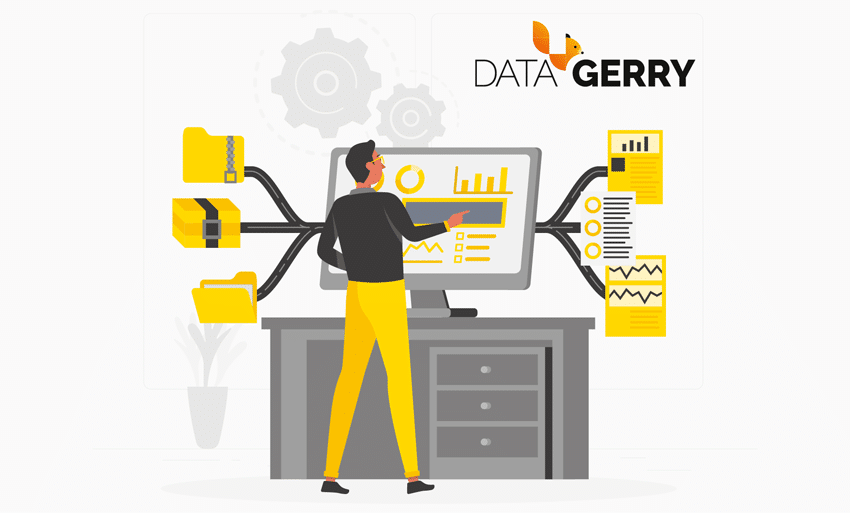Your IT is driving you nuts?
DataGerry – The smart, flexible open-source CMDB & ISMS solution
From mid-sized businesses to large enterprises: Document your IT and compliance assets in a service-centric and flexible way, tailored to your requirements.
What Makes DataGerry Different
The Core Facts about DataGerry
With DataGerry, you are not forced to use our templates or a predefined data schema, but can create your own data model with a high degree of flexibility. We also offer connectors to more than 100 applications via an embedded API integration platform. We are 100% open source, both self-hosted and in the cloud.
Service-centric modeling Capabilities
Flexible data structure, extendable at any time
Modern API-driven GUI
Document Generator
Use-case-specific templates
Guided quick-start Assistants
Integrated GRC (ISO 27001 & NIS2)
Platform for API integrations (NetBox, Wazuh, etc.)
EU-hosted cloud or self-hosted deployment options
Service-centric modeling capabilities
Flexible data structure, extendable at any time
Modern API-driven GUI
Document generator
Use-case-specific templates
Guided quick-start assistants
Integrated GRC (ISO 27001 & NIS2)
Platform for API integrations (NetBox, Wazuh, etc.)
EU-hosted cloud or self-hosted deployment options
Struggling with IT Documentation?
IT Operations Challenges – Under Control with DataGerry
IT environments are becoming increasingly complex: distributed systems, growing compliance requirements, and rising data volumes make it harder to maintain a clear overview. DataGerry helps you address these challenges in a structured and sustainable way.

No transparent view of assets and services?
DataGerry becomes your single source of truth: model services in a service-centric way and document your environment holistically.
Unclear dependencies and impact during changes?
Make relationships visible with the Service Tree and CI Explorer for fast impact analysis.
Manual CMDB maintenance that is never up to date?
Automate updates via REST API, webhooks, and imports.
Tool silos and duplicate data?
The integrated OpenCelium API platform enables data enrichment from and data sharing with more than 100 applications.
Security and compliance pressure (ISO 27001, NIS2)?
Integrated ISMS: risks, controls, and evidence – structured and audit-ready.
ACL-based access control enables granular permissions for sensitive operational and ISMS information.
Vendor lock-in and high costs?
100% open source: open and modular with no license fees – full control over customization and no vendor lock-in.
Deployment model or data location constraints?
Flexible deployment: EU-hosted cloud or self-hosted environments.
NIS2 ready?
Start your NIS2 compliance today
This NIS2 checklist for implementing the new EU requirements provides you with a concise overview of all obligations.
The paper not only provides a concise overview of the legal requirements, but also includes a practical checklist that you can use to check the status of your company step by step and determine the necessary measures. We recommend DataGerry as the central solution for efficient NIS2 compliance.

Real-world use cases
How Companies use DataGerry
IT Service Management
CMDB / Configuration Management
Asset and inventory management
Centralized Data Repository (including data synchronization via integration platform)
Network Management
IP Address Management (IPAM)
Network Documentation (e.g., via NetBox integration)
OT/IoT Documentation
Compliance & Security
ISMS (ISO 27001, NIS2)
Asset Mapping to Security Findings (e.g., SIEM/XDR context)
Non-IT
Medical Devices
Facility Inventory
Fleet Management
Service Inventory
and many more
Ready to Take Control of Your Data?
Start your 14-Day Free DataGerry Trial today
Get hands-on with DataGerry, the open-source CMDB that brings structure and flexibility to your IT documentation. Explore powerful features, automate your workflows, and gain full visibility across your assets — all with zero commitment.

get in touch
Contact the DataGerry Team
Do you have questions or are you facing a particular challenge?
Our dedicated DatGerry team is happy to provide you with a consultation.
Office Address
Hauptstraße 8b, 82008 Unterhaching, Germany
E-Mail
info@datagerry.com
Phone
+49 89 608668 0
Follow us on
